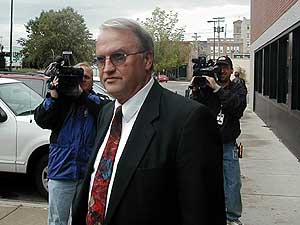Legal system wrestles with how to handle Cold Spring school shooting suspect
October 3, 2003
 |
| Dan Eller says his goal is to keep his client's case in juvenile court. (MPR file photo) |
St. Cloud, Minn. — Two days after the shooting Jason McLaughlin appeared in a Stearns County courtroom. McLauglin's lawyer says that when the attorney general's office made an announcement They wanted to prosecute the 15-year old as an adult.
Lawyers with the attorney general's office refuse to comment. The teenager's attorney, Dan Eller, said after the hearing his goal is to keep the case in juvenile court.
 | |||
"Because he's 15 years old and the juvenile system is allowed to handle a case of this particular type," Eller says. "What we have to show is that he's amenable to treatment within the juvenile system. That's what the rules provide and that's what we're going to trying to do."
There are several things judges consider before certifying a 15-year-old as an adult. They look at the severity of the crime. They investigate the juvenile's past run-ins with the law. They determine if the offender is a threat to the public. And if the juvenile justice system will provide appropriate treatment.
If trends hold true however, this case is likely to end up in adult court.
"School shooters around the nation, Mississippi, Arkansas, the Jonesboro case, Kip Kinkle in Oregon, most of these young people have been certified as adults and are spending 30 years or more in an adult facility," says Richard Lawrence, a professor of criminal justice at St. Cloud State University who wrote the book School Crime and Juvenile Justice.
Lawrence says often teenagers who commit murder don't pose a future threat to the public. He says their violent crimes come in a moment of heated passion in a situation that's not likely to happen again.
|
So why do we lock them up for 30 years? Probably not to protect us from them, but for retribution or just desserts. Also for deterrence.
- Prof. Richard Lawrence, St. Cloud State University |
"So why do we lock them up for 30 years?" Lawrence asks. "Probably not to protect us from them, but for retribution or just desserts. Also for deterrence. To send out the message to other young people in the community of course the purpose of the law is to send a message to the community this cannot be tolerated."
But in Minnesota there's another legal option. It's called extended juvenile jurisdiction.
University of Minnesota law professor Barry Feld helped develop the system. It was passed by the legislature in 1995. Many people with the legal system refer to it as E.J.J.
"The E.J.J. is really designed for a 14 or 15-year old who commits a very serious crime, but whom a judge decides should not be sentenced like any other adult offender," Feld says.
Feld aknowledges that some violent crimes, like school shootings, are too severe to be handled in regular juvenile court. But Feld says a sentence in an extended juvenile jurisdiciton case would keep an offender locked up until they're 21, two years longer than a juvenile sentence.
"In addition the sentence would hang over an offender's head like probation once they're released," Feld says. "If they successfully complete their juvenile sentence until age 21 then they are released from further control. If they violate the conditions of their juvenile sentence or violate probation, then that juvenile sentence can be revoked and the adult sentence can be carried out. In which case they would end up in prison as an adult offender."
Feld says juveniles charged with juvenile crimes should not automatically be tried in adult court. No matter how heinous the crime, he says minors are not responsible for their actions in the same way as adults.
"And so the question in every instance is the culpability and the blameworthiness of this particular individual in causing the terrible harm that they caused. And that requires a much more nuanced and complex judgement than simply look at what they did," Feld says.
Next week the Minnesota attorney general's office is expected to ask a judge to try Jason McLauglin as an adult. At that point both the prosecution and defense have sixty days to make their case.
After 60 days, a judge will decide if McLauglin is tried as an adult, as a juvenile or under the states extended juvenile jurisdiction system.
|
News Headlines
|
Related Subjects
|

